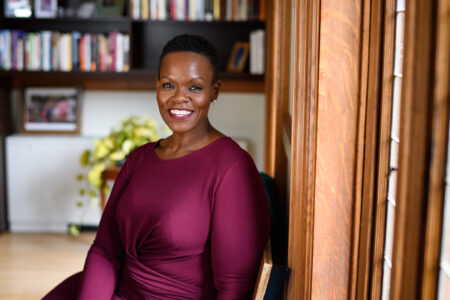Rev. Dr. Theresa Thames: God is doing something new, but we are looking to the past, and our young people are weary
Isaiah 40 frames my keynote address for the 2024 Space for Grace & Spiritual Caregivers Conference. In this passage of scripture, the prophet challenges the mindset of God’s people, who are now in exile and distraught by the realities of life. Their uncertainty about the future limits their capacity to hope and blocks their vision. The prophet tells the people that God’s provision for the future is right in front of them—this is the core of my keynote. Our future is right before us in the younger generation’s hopes, dreams and holy imaginations. Yet, we are distracted by leadership models and ideals of the past instead of cultivating and nurturing the people within our communities and congregations.

Rev. Dr. Theresa Thames is a keynote speaker at Space for Grace & Spiritual Caregivers Conference 2024 in April.
We often hear the adage, “Leaders are born.” While some are born with personality traits we ascribe to leaders, compassionate and effective leaders are formed. The formation and making of a leader starts early and requires intentional focus and time. As I think about intergenerational work, what usually happens is that established leaders onboard younger people way too late, often as a means of resuscitation rather than collaborative innovation.
Leadership cultivation is not just a one-way process—it is relational because, as the saying goes, “Children are our greatest teachers.” The young generations are gifting and equipping us with perspectives and new ways of being that challenge our jadedness. Intergenerational learning requires so much grace and humility. It is also hard. However, the return on the investment of spending time being curious and developing the skills of the younger generation will never go to waste.
I also chose Isaiah 40 because we, too, are experiencing a time in history that can feel like a period of exile. We are trying to understand the very pressing realities of life amid endemics, a global pandemic, wars and the systems that govern our nation. There are real concerns regarding the future of denominations. In our desperation, there is dishevelment, dislocation and grasping at straws. And yet, I still believe that even in this moment, God is doing a new thing, but we are looking to the past, and our young people are weary. They are tired of being put on the back burner, overlooked and then asked to put on capes to save dying churches and institutions.
One of the sessions at ABHMS’ pending national conference that piqued my interest is about care: self-care and wellness. Care and wellness are important because we often forget that our gifts are in our physical bodies with human needs and limitations. The lack of boundaries and self-care practices leads to clergy and leader burnout way too young. This session on care and wellness is pivotal to the thriving of leadership as we see data that shows that the burnout rate of faith-based leaders is higher than that of their secular peers. In creating environments where leaders can grow in relationships, skills and have tools for wellness, we foster what it means to cultivate community.
The Reverend Dr. Theresa S. Thames is associate dean of religious life and of the chapel at Princeton University. Being a Black woman from the Deep South—born and raised in Biloxi, Mississippi—informs her sense of the world. She is a graduate of Howard University, Duke University Divinity School and Wesley Theological Seminary. Thames thrives at the intersections of theology, race and culture, gender, and social justice. Though an ordained United Methodist elder, she identifies as poly-religious regarding her life of faith and spiritual practices in exploring God’s depth and breadth. She is a thoughtful theologian, challenging preacher and sought-after speaker who shares her brilliance on platforms such as The Moth, Omega Institute, Netflix, and many others. She is also the founder and CEO of Soul Joy Coaching & Yoga LLC.

